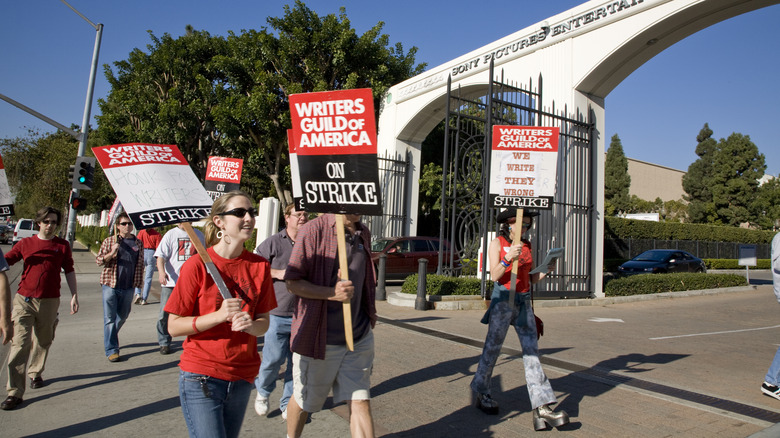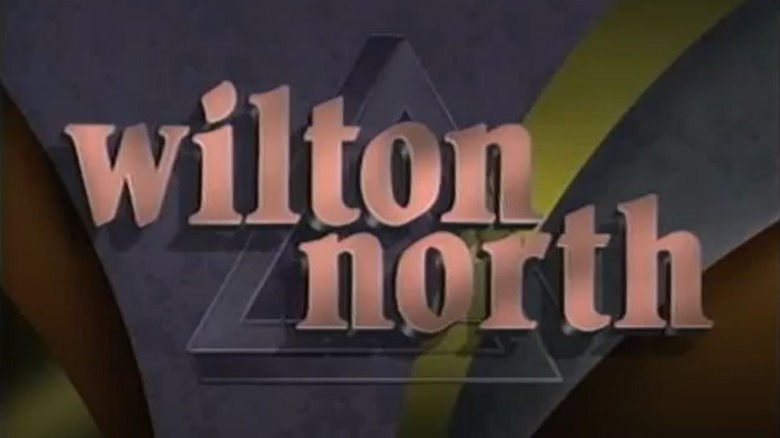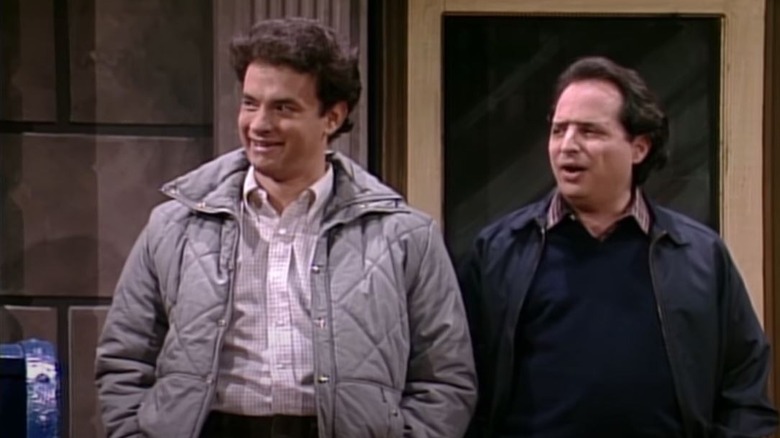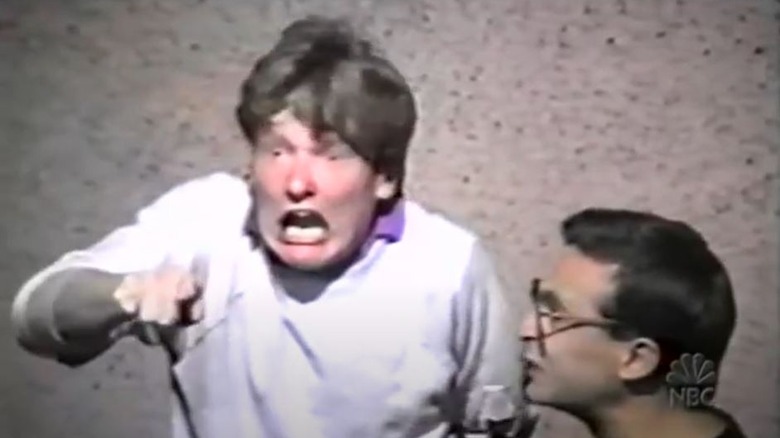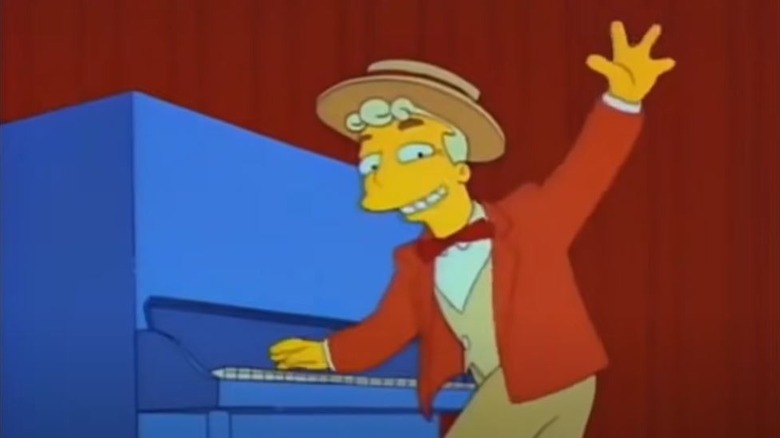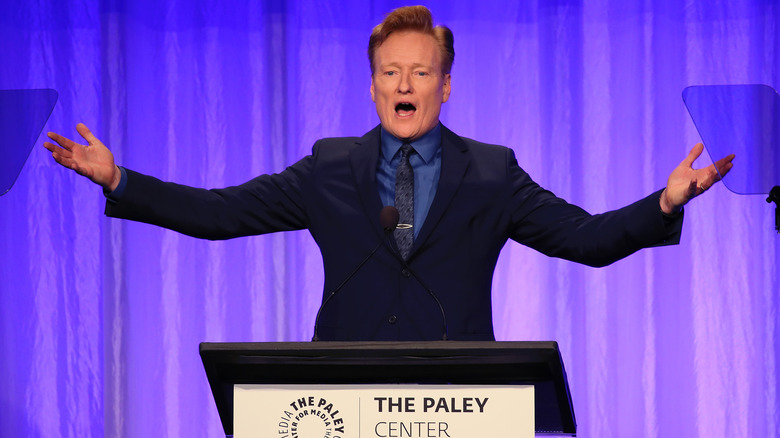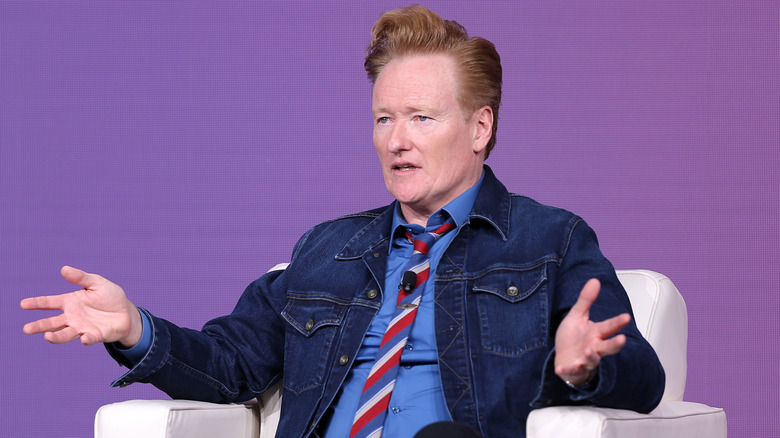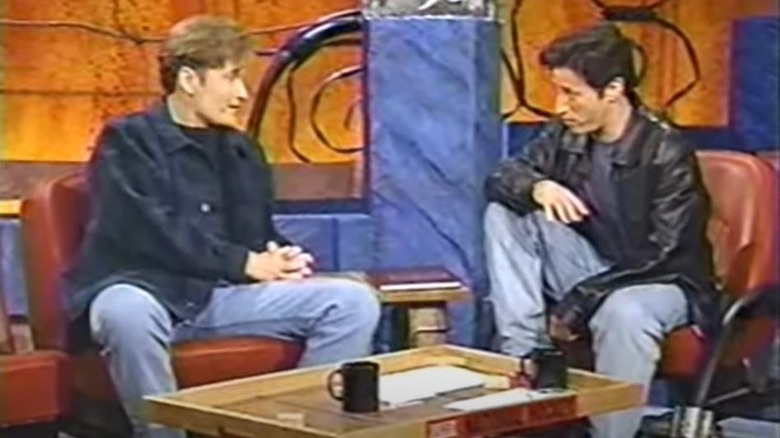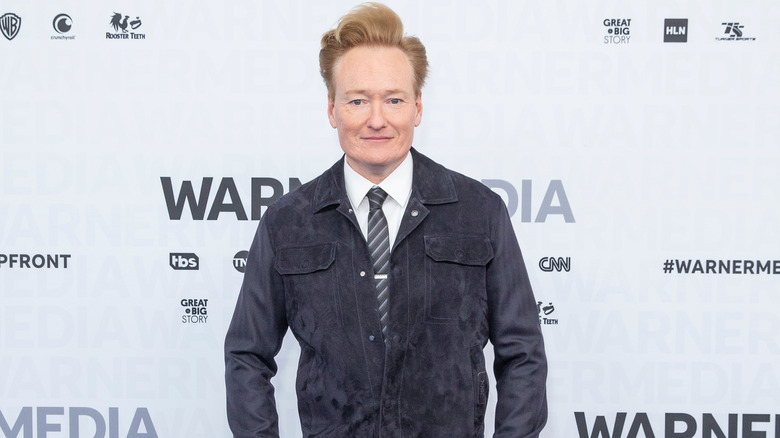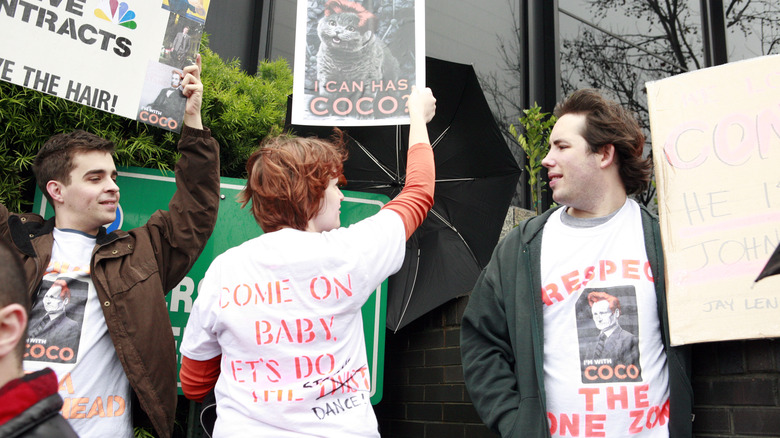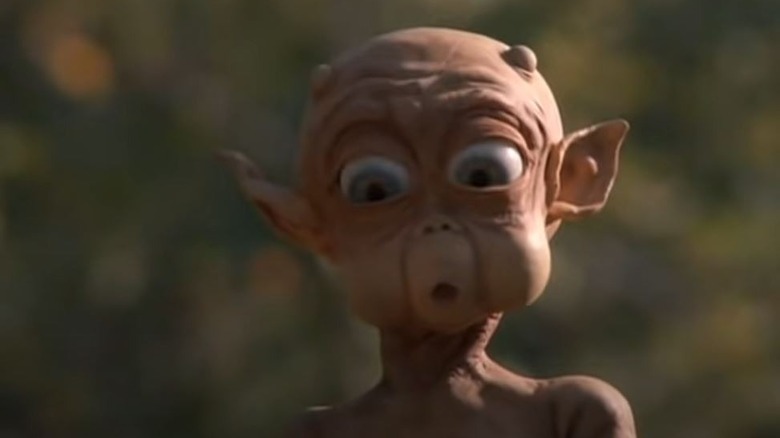The Untold Truth Of Conan O'Brien
Conan O'Brien is a TV institution. He's been a talk show host for almost 30 years, from "Late Night" to "Conan." He's behind some of the best episodes of "The Simpsons." His brief run on "The Tonight Show" (and the spectacular public implosion that followed) is one of the most documented TV happenings of the past quarter century. Now, after leaving the talk show world, he is embarking on new ventures that reportedly will include streaming variety shows, podcasts, and who knows what else.
So, what's left to say about Conan? Plenty, it turns out.
There's the deal he almost cut with Fox in 2001. There's the comedy revue he did with Bob Odenkirk and Robert Smigel in the summer of 1988. There's also his many, many pranks as president of the Harvard Lampoon. For details on those and other obscurities, read on to learn some things you might not know about one of the funniest, most innovative men in late night history.
His legendary yet forgotten pranks at Harvard
Conan served as president of the legendary Harvard Lampoon during his time in Cambridge. He earned a reputation as a prankster. At least two pranks attributed to him have become the stuff of legend — and a third came back to haunt all parties involved.
The first one, confirmed by the parties involved, occurred when Burt Ward came to lecture about his time playing Robin on the classic '60s show "Batman." Ward boasted in flyers that his costume was worth half a million dollars, so O'Brien became determined to take him down a peg. As such, O'Brien and a friend showed up in security guard outfits to the speech, claiming to Ward that the dean sent them to protect the costume. During a Q&A, another friend dressed up as the Penguin stood up and asked "When is a costume not a costume? When it's stolen." Someone hit the lights, at which point they grabbed the costume and ran off — then spent the day calling Ward and taunting him like a Batman villain.
The second was reported by Harvard Magazine, who noted that O'Brien declined to comment "on advice of counsel" about this legend. As the story goes, O'Brien (allegedly) and a group of his friends somehow got their hands on a jackhammer and other construction gear. They dressed up in hard hats and started tearing up the pavement. He called the Boston police to report that college students dressed as construction workers were ripping up the street. He then called the Massachusetts state police, claiming to be construction workers being harassed by college students dressed as local cops. As such, the Massachusetts police showed up to arrest the Boston police who showed up to arrest the college students.
The third, and most prescient, was the time that Jeff Zucker called the cops on Conan. This was back in the '80s, when O'Brien was in charge of the Lampoon and Zucker was the president of the Harvard Crimson. The two papers have a longstanding rivalry, and O'Brien orchestrated stealing an entire print run of the Crimson before it could be distributed as part of a prank war. This whole exchange was unearthed by Deadline in the waning days of the 2010 "Tonight Show" conflict, during which Zucker had once again caused problems for Conan.
He sometimes paid staff out of his own pocket
On at least two occasions, O'Brien's staff were — through no fault of their own — put in financially-perilous situations. On both of those occasions, O'Brien personally helped pay their bills.
The 2007-08 WGA strike saw, among many other things, late night shows temporarily leave the air while the Writers Guild fought for a new contract. Since the shows weren't running, the network furloughed between 75 to 80 members of his non-writing production staff. During this time, O'Brien paid the salaries of these employees out of his own pocket until taping resumed.
Fast forward to 2010. O'Brien's tenure on "Tonight" is coming to a close. One of the big contingencies of the separate deal was that O'Brien wanted his staff to get paid. All told, reports indicate that his severance package paid his staff somewhere between $7.5 to $12 million. Even so, about 50 stagehands were excluded from this payout. According to TMZ, O'Brien paid them six weeks severance — once again, out of his own pocket.
TMZ later reported that "The Legally Prohibited From Being Funny On Television Tour" primarily existed to keep his staff employed and paid while he was between shows.
"The Wilton North Report"
Before joining "Late Night," "The Simpsons," or even "Saturday Night Live," Conan O'Brien was a writer for a forgotten show called "The Wilton North Report."
Running on the then-nascent Fox network, it was one of his first gigs out of college. The show was a mess with no clear identity, a big part of why it got canceled after only a month. Even so, the show does have one particular distinction: It may have housed one of the best writers room in television history. Besides O'Brien, there was counterculture icon Paul Krassner and three other young writers who'd define TV for the next 30+ years: Greg Daniels ("King of the Hill," the American version of "The Office," "Parks and Rec") Nell Scovell ("Sabrina, The Teenage Witch"), and Danny Zuker ("Modern Family").
In addition to writing and performing the odd skit, O'Brien served as the warmup comic before the show. He later told the AV Club that "There's no better experience in television than to work on a flop. Because you learn all these amazing things that help you later on. It's being a part of a horrible shipwreck that makes you a better sailor, provided you stay in the business. I learned a lot." It was failing on this show that let him know he had potential on "Late Night," even when he was floundering early on.
Writing "The Girl Watchers" on "SNL"
Conan O'Brien wrote for "Saturday Night Live" from 1988 to 1991. Perhaps the most famous sketch O'Brien created was "The Girl Watchers." The sketch had two men — often played by Tom Hanks and Jon Lovitz — standing on the street, confidently hitting on girls ("Helllllooooooooooo") and just as confidently dealing with inevitable rejections ("Goooooooodbyyeeeeee").
On the podcast ArmChair Expert with Dax Shepard, O'Brien used this sketch as an example of his writing process: "I wouldn't sit down with a piece of paper and write. I would do things for my friends." The genesis of this one came when he was walking in midtown Manhattan with fellow writers Robert Smigel, Bob Odenkirk, and Greg Daniels: "This attractive girl started to go by. I wasn't doing it so that [the woman] could hear me, but I'd be like, 'Well, she's lookin' pretty sweet.' And then the girl would walk by and I'd go, 'And my penis is too small and my head is too fat.'"
When his friends started laughing, they all got together and wrote up the sketch. When Al Franken asked how O'Brien came up with the bit, he replied: "I don't know. I was just doing it."
The Happy Happy Good Show
During the summer of 1988, three "Saturday Night Live" writers — O'Brien, Bob Odenkirk, and Robert Smigel — had a lot of free time on their hands. Between the ongoing WGA strike and what would be the "SNL" offseason, they needed to do something to keep their creative juices flowing. As such, they landed on a comedy revenue named "Happy Happy Good Show." It played at the Victory Gardens Studio Theater in Chicago.
Only one piece of footage is known to exist: a sketch featuring Odenkirk and O'Brien, during which O'Brien made facial expressions and Odenkirk provided strange voices to match. The show received awful reviews, with the Chicago Tribune noting that "Most of the skits in this show fall flat, underdeveloped and incomplete, little more, really, than blueprint works-in-progress." A sketch featuring Conan was mentioned as a low point: "O'Brien provides a sendup of awkward audience participation sessions by coming out with a spoon cupped in his eye and asking the audience for impromptu questions so he can develop this new character. The trouble is, a mockery of bad show business all too often is bad show business itself, and that's the case."
Even so, two sketches in particular had a future outside of the show. The first took place at a nude beach where the cast's bodies were covered by conveniently placed beach objects — similar to the infamous Nude Beach sketch that aired on "SNL" that fall. The second saw the cast making outlandish predictions about the future, which Conan fans might recognize as "In The Year 2000."
Much of "Marge vs. The Monorail" was his first draft
O'Brien's run on "The Simpsons" produced some of the best work in television history. The word "iconic" is a tad overused, but it's hard to find a better way to describe his magnum opus: "Marge vs. the Monorail." "[P]eople still come up and want to talk with me about 'Marge Vs. the Monorail,'" O'Brien told BuzzFeed, "and they can quote from it and I can't. I've forgotten it all." He also revealed the origin point: "I was driving on Pico Boulevard in Los Angeles and I saw a billboard that just said 'MONORAIL.' I think someone was proposing it for public transportation, and I drove by and saw it and started to think about 'The Music Man.'" He figured Homer would be the kind of person to get excited about fancy new technology, and it spun out from there.
An oral history of the episode on Vice broke down its inner workings, with testimony that it was good from the first draft. Story editor Josh Weinstein said that "Working with Conan was like watching a ten-hour episode of his show, every day, in the writers' room. All the other writers are hilarious, but most of them are quiet and thoughtful, whereas Conan's just out there. Although he's crazy, he's a super anal writer. Some first drafts require a lot of rewriting, but his first draft was excellent."
Producer Jeff Martin backed this up, especially about the memorable part of the episode: "Every single word of the monorail song was unchanged from Conan's first draft, which is impressive." Martin was also there during the song's conception, saying that "I remember him writing the monorail song and he knew he had something good. He was very tickled by what he was coming up with. He would pop into my office with a couplet, like Wiggum saying, 'The ring came off my pudding can / Take my pen knife, my good man.' He was narrating that to me as he wrote it."
Conan had to pay his own way out of his "Simpsons" contract
O'Brien's jump from "The Simpsons" to "Late Night" was an unusual one, but also a lucrative one. It's easy to understand that TV hosts get paid more than TV writers, especially in the early days of shows like "The Simpsons." What's harder to understand is that O'Brien had to pay his way out of his "Simpsons" contract, due to a stubborn Fox executive.
O'Brien recalled in the book "The Simpsons: An Uncensored, Unauthorized History" that an executive at Fox decided he still owed money on his contract. "So I think NBC paid half, and I paid half. I actually had to pay my way out of Fox, which always felt a little strange."
Gavin Polone, O'Brien's agent and manager, said "[Fox] actually demanded money. And it wasn't a situation where he was going to compete against them. They could have built goodwill, and they just dispensed with all of that, so they could squeeze a writer (who wasn't making huge money to begin with) out of $100,000. It's pretty funny."
He got letters from two former "Tonight" hosts when starting "Late Night"
When O'Brien first got "Late Night," there weren't many people in his corner. The general public had no idea who he was, never mind why he was taking over for a TV icon like David Letterman. Years later, however, he revealed that he had the private backing of two former "Tonight Show" hosts.
"I have a congratulatory letter from Jack Paar," O'Brien revealed in a 2016 interview with Vanity Fair, "that is on a font from a typewriter that looks like it's from the 1920s." What advice did it contain? "[I]n the letter, he says, 'wear blue shirts, get a dog, and marry a good woman,' and I did all those things." That's not all: "I have a letter from Steve Allen that says, 'good luck on your latest assignment. If you need help, contact me.'"
His first three years on "Late Night" were rough
Conan got off to an infamously rough start as a talk show host. The first three years in particular were the hardest, a mark that O'Brien has embraced as part of his story.
He once told Vulture that the first three years "felt like being in a street fight just to stay alive," and listed them as a completely different era than the next 16 years of the show. He has also used it as a source of self-deprecating humor: During the show's 10th Anniversary Special, Mr. T gave O'Brien a "7" medallion. When O'Brien pointed out that it was 10 years, Mr. T. said "You only been funny for seven!"
What's often lost in this story is how perilously close he came to getting booted from the air — and the big names people wanted to replace him.
About a year into production, NBC put Conan's "Late Night" on a week-to-week contract. The show had an axe dangling over it for months, and the network wanted so desperately to cancel it at times. They had their eyes on the host of "Later," the talk show immediately following "Late Night." When this host, a guy by the name of Greg Kinnear, decided to try his luck in Hollywood, Conan barely survived.
He also had a bigger threat: a hip young comic at MTV named Jon Stewart. After getting rejected from hosting "Late Night," MTV snapped up Stewart and gave him "the Jon Stewart Show" — which quickly became the coolest talk show on TV. He nabbed the demo Conan was expected to get, and the parallels became so obvious that New York Magazine ran an article about Stewart titled "The Man Who Should Be Conan."
He almost went to Fox ... in 2001
When it became clear that Conan wasn't keeping "Tonight," Fox was the most obvious suitor for his next show. It was the only one of the big four networks without a talk show, and could almost certainly pay him the biggest salary. O'Brien told Vulture that he picked TBS over Fox in part because "I don't think Fox had the affiliates lined up so we might have had to start out only being carried partially by affiliates."
What is often forgotten is that this was the second time he met with Fox, and how close he came to making a deal the first time around. This meeting is detailed in Bill Carter's book "The War For Late Night," about the 2010 "Tonight Show" conflict.
In 2001, O'Brien was in the middle of negotiations with NBC. Prime among the issues was money — O'Brien was only being paid $3 million a year (Leno and Letterman got $25 mil), and they offered him a 10% raise.
Sensing an opening, Fox made a blowaway offer: an 11pm start time; promotion during youth-oriented shows like "Family Guy," "The Simpsons," and Sunday Night Football; billing as the network's Big Star; and, most critically, a salary of $21 million a year. They also gave Conan a prescient warning: that waiting for Leno to leave would only lead to disappointment. Fox executive Peter Chernin said "Jay's not going anywhere, and if you wait for 'The Tonight Show,' it won't be worth what it is today."
As tempting as the offer was, O'Brien had several reservations. Two of the chief ones: he was upset about losing his body of work by moving to another network, and he still craved "The Tonight Show." Though O'Brien often says he has no regrets, it's undeniable that Chernin was correct.
NBC thought he astroturfed "I'm With Coco"
One of the most visible parts of the 2010 Tonight Show conflict was the online support, a novel concept at the time. As it turned out, it wasn't just critical for O'Brien's showbusiness survival — it was a harbinger of things to come.
This was, of course, back before talk shows regularly uploaded bite-sized bits to YouTube for easy consumption. Options for watching a show at the time were limited to watching it live, catching the replay on Hulu (back when it was free), or looking on the network website the next day. The "I'm With Coco" movement was the start of something new, something he credits with "saving" him.
The online support was, in fact, too novel for some. O'Brien told Vulture in 2018 that "It even got back to me that NBC thought I was orchestrating all this grassroots online support, which I wouldn't have known how to do." The fact that a major corporate entity thought O'Brien was astroturfing his support speaks to how passionate it was.
The origins of the "Mac And Me" clip
One of the most notorious recurring bits from O'Brien's late night tenure has nothing to do with Conan and everything to do with Paul Rudd.
Since 2004, whenever Rudd showed up to promote his work on any of O'Brien's shows, Rudd would play the same bizarre "wheelchair rolling down a cliff" excerpt from the 1988 "E.T" ripoff "Mac And Me." Every time, Rudd convinced O'Brien that he wouldn't play that clip — then did it anyway.
Rudd explained the origins of the clip (via THR) on "Conan O'Brien Needs A Friend," O'Brien's podcast. It started with Rudd's dislike of promotion: "There's something so tricky about it. Cause here I am. I'm gonna sell my wares on TV. Like, 'Here's something from what I just filmed.' It just seemed — and still does to a large extent — kind of insincere." As such, he picked a completely meaningless clip from "Mac And Me," a bad movie he stumbled across on TV.
Rudd also revealed there was another clip in contention: one from the much-maligned 1999 film "Baby Geniuses." He describes the scene that never made it: "This team of thugs are trying to track him down, trying to get this baby, and then they cut to the baby fighting a group of men and it's clearly a stunt little person just beating up these guys."


